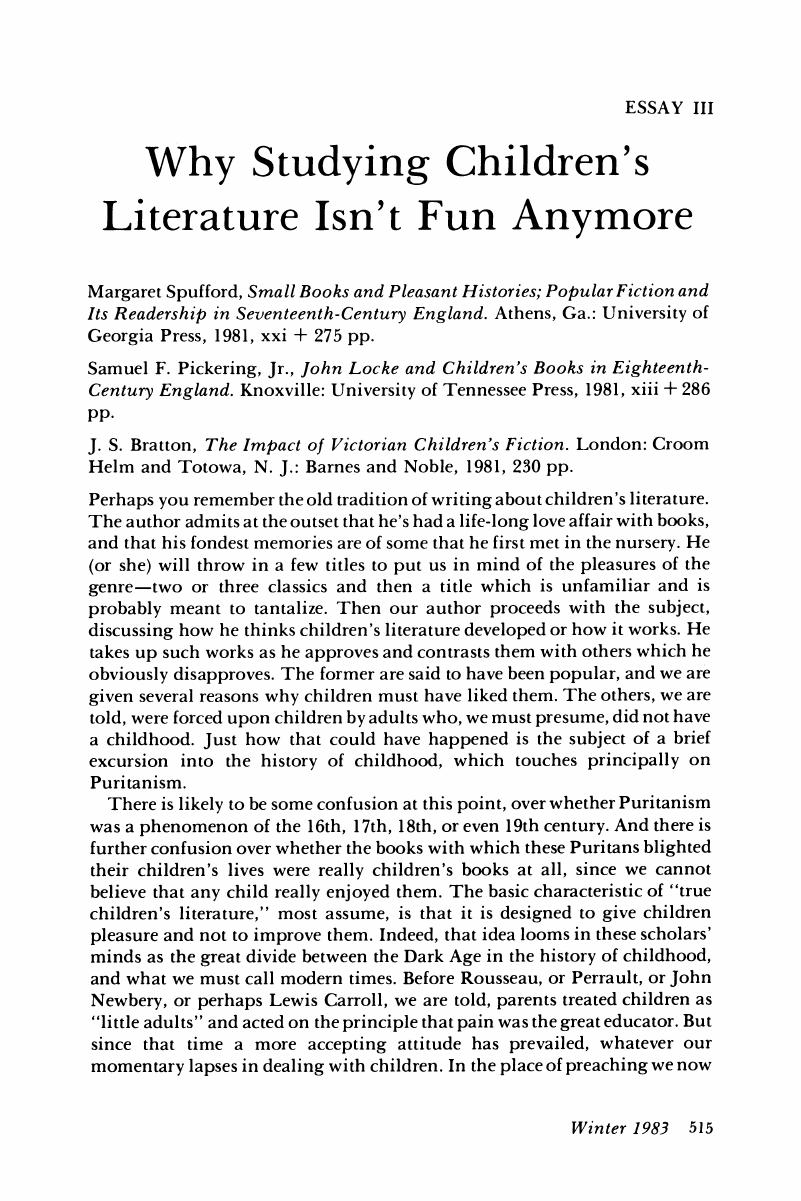No CrossRef data available.
Article contents
Why Studying Children's Literature Isn't Fun Anymore - Margaret Spufford, Small Books and Pleasant Histories; Popular Fiction and Its Readership in Seventeenth-Century England. Athens, Ga.: University of Georgia Press, 1981, xxi + 275 pp. - Samuel F. PickeringJr. John Locke and Children's Books in Eighteenth-Century England. Knoxville: University of Tennessee Press, 1981, xiii + 286 pp. - J. S. Bratton, The Impact of Victorian Children's Fiction. London: Croom Helm and Totowa, N. J.: Barnes and Noble, 1981, 230 pp.
Published online by Cambridge University Press: 24 February 2017
Abstract

- Type
- Essay Review III
- Information
- Copyright
- Copyright © 1983 by History of Education Society
References
Notes
1. Lewis, C. S. (ed.), Of Other Worlds; Hooper, Walter (ed.),Essays and Stories (New York, 1966), pp. 38, 23, 39.Google Scholar
2. Auden, W. H., (ed. Mendelson, Edward), Forewords and Afterwords (New York, 1974), pp. 204–208.Google Scholar
3. Bettelheim, Bruno, The Uses of Enchantment; The Meaning and Importance of Fairy Tales (New York, 1977), pp. 104–105, 37.Google Scholar
4. See Hersh, Richard H., et al., Promoting Moral Growth: From Piaget to Kohlberg (New York, 1979), and Rihn, Bernard, “Kohlberg level of moral reasoning of protagonists in Newbery Award winning fiction,” Reading Research Quarterly, 15 (1980): 377–398.Google Scholar
5. Modesty has failed to prevent me from mentioning my The Rise and Fall of Childhood (Beverly Hills: Sage, 1982).Google Scholar
6. Burke, Peter, Popular Culture in Early Modern Europe (New York, 1978), Chapter 2.Google Scholar
7. For examples, Vincent, Thomas, Words of Advice to Young Men (London, 1668), sig. A2V ; Trenchfield, Caleb, A Cap of Gray Hairs for a Green Head, fifth edition (London, 1710), p. 35; Jacomb, Thomas, A Treatise of Holy Dedication (London, 1668), p. 212; Doolittle, Thomas, The Young Man's Instructer (London, 1673), sig. A6V; [Burghall, Edward], The Great Benefit of the Christian Education of Children (London, 1663), p. 11.Google Scholar
8. Baxter, Richard, The Mother's Catechism , in The Pratical Works of Richard Baxter, 4 (London, 1854), pp. 34–64.Google Scholar
9. For examples, Paget, John, A primer of Christian religion, or a forme of catechising, drawne from the beholding of God's works in the creation of the world (London, 1601); Vincent, Thomas, The Principles of the Doctrine of Christ, or A Catechism (London, 1691); [ Shaw, Samuel], Words made Visible (London, 1969), and idem, The Different Humours of Men (London, 1692).Google Scholar
10. Weinstein, Fred and Platt, Gerald M., The Wish to be Free; Society, Psyche, and Value Change (Berkeley, 1969); Thompson, E. P., The Making of the English Working Class (New York, 1963). Coveney, Peter, The Image of Childhood (Baltimore, 1967), focuses on the same question in a later period. Greven, Philip, The Protestant Temperament; Patterns of Child-Rearing, Religious Experience, and the Self in Early America (New York, 1977) leaves much of his treatment in religious terms, whether by conviction or uncertainity.Google Scholar




